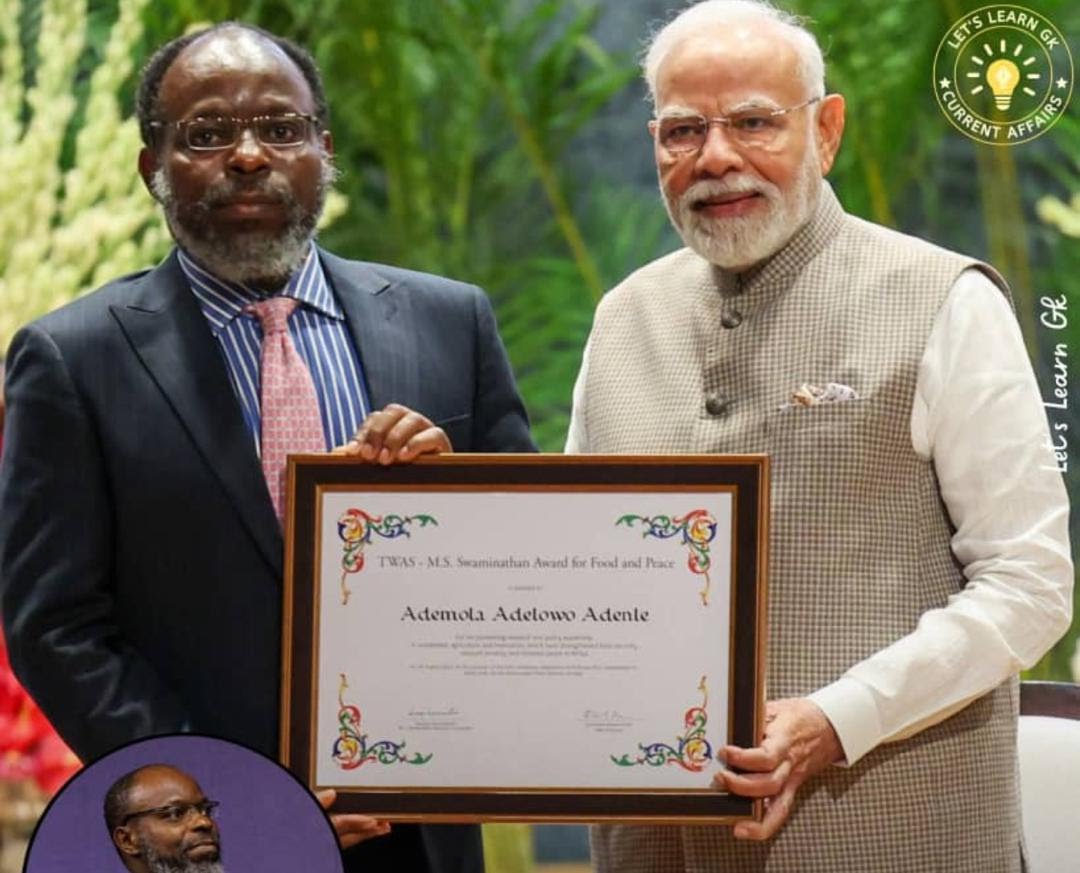Nigeria’s Prof. Ademola Adenle Wins Inaugural Global M.S. Swaminathan Award for Food and Peace

Historic recognition celebrates visionary African scientist at the forefront of sustainable development and global food security.
Professor Ademola Adenle, a distinguished Nigerian scholar and sustainability expert, has made history as the first-ever recipient of the prestigious World Academy of Sciences – M.S. Swaminathan Award for Food and Peace. The award, widely regarded as a "mini Nobel Peace Prize," was presented by Indian Prime Minister Narendra Modi during the M.S. Swaminathan Centenary International Conference in New Delhi.
This new global honour was established in memory of the late Professor M.S. Swaminathan, revered as the "Father of India’s Green Revolution." It celebrates individuals from developing nations whose work drives transformative progress in food security, sustainable agriculture, and peacebuilding.
Prof. Adenle, who currently serves as Senior Special Adviser on Agricultural Innovation in Nigeria’s Federal Ministry of Agriculture, was recognised for his groundbreaking efforts in harnessing science and innovation to tackle some of the world’s most pressing challenges—climate change, food insecurity, public health threats, and energy poverty—particularly across Africa and the Global South.
> “Receiving this award is a profound honour,” Prof. Adenle said. “As the son of a smallholder farmer, I saw firsthand the realities of low agricultural productivity and rural poverty. This recognition strengthens my commitment to using science and innovation as tools for building a more just, food-secure, and sustainable future.”
Prof. Adenle’s work bridges agricultural policy, biosciences, renewable energy, and public health, with a focus on empowering vulnerable communities through practical, scalable solutions. His contributions have shaped regional and global dialogues on sustainability, especially regarding climate-resilient agriculture, equitable access to technology, and inclusive development policies.
Looking to the future, Prof. Adenle will launch a transformative Women in Biosciences Initiative, designed to boost rural agricultural productivity through training, entrepreneurship, and technology adoption. The initiative also aims to improve public health by addressing malnutrition and waterborne diseases, while reducing energy poverty through expanded access to solar energy. In collaboration with the M.S. Swaminathan Research Foundation, this work will be implemented across both Africa and Asia, continuing the legacy of linking scientific innovation with social equity.
In his award remarks, Prime Minister Modi hailed Prof. Adenle as a “beacon of hope” and a symbol of the power of science to uplift humanity.
Prof. Adenle’s recognition is a testament to the rising influence of African scientists in shaping the global sustainability agenda. His vision calls for stronger investment in research, robust rural infrastructure, inclusive technology policies, and financing systems that prioritise women and youth in agriculture.
> “The Global South faces enormous hurdles in achieving the Sustainable Development Goals,” Prof. Adenle added. “But through partnerships, innovation, and a shared commitment to equity, we can accelerate progress. I dedicate this award to smallholder farmers and rural communities whose resilience continues to inspire me.”
Prof. Adenle’s historic achievement not only cements his place as a global leader in sustainability science—it also serves as a rallying call for the international community to unite in pursuit of a more food-secure, equitable, and sustainable world.

